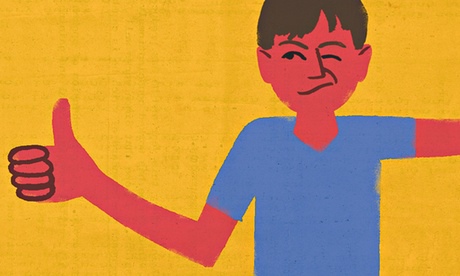
As an incurably ambivalent person, let me tell you this: I’ve got pretty mixed feelings about it. The world celebrates decisiveness and clarity, and dismisses as fence-sitters those of us who see both sides of an argument. You can “like” things on Facebook, and sometimes a “dislike” button gets suggested, but there will never be one labelled “like and dislike”. “There is no respectable way to confess that you believe two opposing propositions,” wrote author and self-confessed ambivalent person Ian Leslie in Slate, “no questionnaire in which you can tick the box, ‘I agree with both of these conflicting views’… So [we] avoid the question, or check ‘I don’t know’”. But “don’t know” sounds like indifference or ignorance, whereas ambivalence means having strong feelings that clash. Meanwhile, we champion those with the so-called “courage of their convictions”, even though such people have started 100% of all wars. Then again, some wars are justifiable, so… God, I’m not sure what I think.
It was with uncharacteristically non-ambivalent pleasure, then, that I read two recent studies suggesting ambivalence has its upsides. One concluded that having conflicting goals can lead to better decisions, because the conflict forces us to reflect deeply on our options. The other concerned “ambivalent relationships” – frenemies – in the workplace. Having a love-hate dynamic with a colleague might make you better at your job, these researchers argue, since you’re constantly prompted to switch to their perspective to try to understand their actions. That’s “a useful trigger for seeing the world anew,” psychologist Naomi Rothman told New York magazine – and her work isn’t the first to link ambivalence to creativity.
This isn’t to say that ambivalence is an unalloyed good. (This is ambivalence we’re talking about.) It’s been linked to stress and high blood pressure, and the chronic form of it poisons romantic relationships. But it also serves as a safeguard against falling into ruts, delivering jolts of perspective that help you see people, places and projects with fresh eyes. There’s a case for deliberately keeping some ambivalence in your life: staying in touch with frenemies, reading books or visiting places you can’t make up your mind about. A life filled only with people and things you love can be too smooth, even deadening.
Another thing we ambivalent types eventually figure out: life’s big dilemmas – the ones that trigger most ambivalence – rarely get solved by acting “decisively” and plumping for one option over others. “The greatest and most important problems of life are all in a certain sense insoluble,” wrote Carl Jung. They can’t be solved, only outgrown: “Some higher or wider interest arose on the person’s horizon, and through this widening of his view, the insoluble problem lost its urgency. [It] now seemed like a storm in the valley seen from a high mountain-top. This does not mean that the thunderstorm is robbed of its reality, but instead of being in it, one is now above it.” You won’t get rid of ambivalence. But you can, perhaps, grow to feel a bit less ambivalent about that.
• Follow Oliver on Twitter.
oliver.burkeman@theguardian.com

